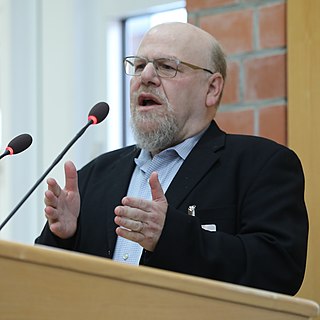External links
- Department of Cognitive Science at Rensselaer Polytechnic Institute
- Rensselaer AI & Reasoning Lab
- Selmer Bringsjord Personal web site at Rensselaer Polytechnic Institute
Selmer Bringsjord | |
|---|---|
| Born | November 24, 1958 |
| Academic background | |
| Alma mater | |
| Academic work | |
| Institutions | |
Selmer Bringsjord (born November 24,1958) is the chair of the Department of Cognitive Science at Rensselaer Polytechnic Institute and a professor of Computer Science and Cognitive Science. [1] He also holds an appointment in the Lally School of Management &Technology and teaches artificial Intelligence (AI),formal logic,human and machine reasoning,and philosophy of AI.
Bringsjord's education includes a B.A. in Philosophy from the University of Pennsylvania and a Ph.D. in Philosophy from Brown University. He conducts research in AI as the director of the Rensselaer AI &Reasoning Laboratory (RAIR). He specializes in the logico-mathematical and philosophical foundations of AI and cognitive science,and in collaboratively building AI systems on the basis of computational logic. [2]
Bringsjord believes that "the human mind will forever be superior to AI",and that "much of what many humans do for a living will be better done by indefatigable machines who require not a cent in pay". Bringsjord has stated that the "ultimate growth industry will be building smarter and smarter such machines on the one hand,and philosophizing about whether they are truly conscious and free on the other". [3]
Bringsjord has an argument for P = NP using digital physics. [4] Other research includes developing a new computational-logic framework allowing the formalization of deliberative multi-agent "mindreading" as applied to the realm of nuclear strategy,with the goal of creating a model and simulation to enable reliable prediction. [5] He has published an opinion piece advocating for counter-terrorism security ensured by pervasive,all-seeing sensors;automated reasoners;and autonomous,lethal robots. [6]
Prof. Selmer Bringsjord received a National Science Foundation award to research Social Robotics [7] and the Covey Award [8] for the advancement of philosophy of computing awarded by the International Association for Computing And Philosophy,among several others prizes.

In artificial intelligence, symbolic artificial intelligence is the term for the collection of all methods in artificial intelligence research that are based on high-level symbolic (human-readable) representations of problems, logic and search. Symbolic AI used tools such as logic programming, production rules, semantic nets and frames, and it developed applications such as knowledge-based systems, symbolic mathematics, automated theorem provers, ontologies, the semantic web, and automated planning and scheduling systems. The Symbolic AI paradigm led to seminal ideas in search, symbolic programming languages, agents, multi-agent systems, the semantic web, and the strengths and limitations of formal knowledge and reasoning systems.

Judea Pearl is an Israeli-American computer scientist and philosopher, best known for championing the probabilistic approach to artificial intelligence and the development of Bayesian networks. He is also credited for developing a theory of causal and counterfactual inference based on structural models. In 2011, the Association for Computing Machinery (ACM) awarded Pearl with the Turing Award, the highest distinction in computer science, "for fundamental contributions to artificial intelligence through the development of a calculus for probabilistic and causal reasoning". He is the author of several books, including the technical Causality: Models, Reasoning and Inference, and The Book of Why, a book on causality aimed at the general public.

James Alexander Hendler is an artificial intelligence researcher at Rensselaer Polytechnic Institute, United States, and one of the originators of the Semantic Web. He is a Fellow of the National Academy of Public Administration.
Hybrid intelligent system denotes a software system which employs, in parallel, a combination of methods and techniques from artificial intelligence subfields, such as:
The philosophy of artificial intelligence is a branch of the philosophy of mind and the philosophy of computer science that explores artificial intelligence and its implications for knowledge and understanding of intelligence, ethics, consciousness, epistemology, and free will. Furthermore, the technology is concerned with the creation of artificial animals or artificial people so the discipline is of considerable interest to philosophers. These factors contributed to the emergence of the philosophy of artificial intelligence.
The International Association for Computing and Philosophy (IACAP) is a professional, philosophical association emerging from a history of conferences that began in 1986. Adopting its mission from these conferences, the IACAP exists in order to promote scholarly dialogue on all aspects of the computational/informational turn and the use of computers in the service of philosophy.

James Henry Fetzer is an American professor emeritus of the philosophy of science at the University of Minnesota Duluth, known for promoting conspiracy theories and Holocaust denial. Fetzer has worked on assessing and clarifying the forms and foundations of scientific explanation, probability in science, philosophy of mind, and philosophy of cognitive science, especially artificial intelligence and computer science.
The following outline is provided as an overview of and topical guide to artificial intelligence:

Aaron Sloman is a philosopher and researcher on artificial intelligence and cognitive science. He held the Chair in Artificial Intelligence and Cognitive Science at the School of Computer Science at the University of Birmingham, and before that a chair with the same title at the University of Sussex. Since retiring he is Honorary Professor of Artificial Intelligence and Cognitive Science at Birmingham. He has published widely on philosophy of mathematics, epistemology, cognitive science, and artificial intelligence; he also collaborated widely, e.g. with biologist Jackie Chappell on the evolution of intelligence.

Lorenzo Magnani, is an Italian philosopher who teaches philosophy of science in the Department of Humanities, Philosophy Section, at the University of Pavia, full professor and director of the Computational Philosophy Laboratory and, since 2023, is also professor on contract of Artificial intelligence and knowledge, a course sponsored by Collegio Cairoli and Collegio Giasone del Maino, Pavia. He has been (2006/2012) visiting professor at the Sun Yat-sen University in China. In the event of the 50th anniversary of the re-building of the Philosophy Department of Sun Yat-sen University in 2010, an award was given to him to acknowledge his contributions to the areas of philosophy, philosophy of science, logic, and cognitive science.

The Carnegie Building is the current home of the Cognitive Science Department at Rensselaer Polytechnic Institute in Troy, New York. It is one of the westernmost buildings on the campus and as such provides scenic views overlooking the city of Troy and the Hudson River. The four-story building is named for Andrew Carnegie who donated $125,000 for its construction, which was completed in 1906.
Ron Sun is a cognitive scientist who made significant contributions to computational psychology and other areas of cognitive science and artificial intelligence. He is currently professor of cognitive sciences at Rensselaer Polytechnic Institute, and formerly the James C. Dowell Professor of Engineering and Professor of Computer Science at University of Missouri. He received his Ph.D. in 1992 from Brandeis University.
The LIDA cognitive architecture is an integrated artificial cognitive system that attempts to model a broad spectrum of cognition in biological systems, from low-level perception/action to high-level reasoning. Developed primarily by Stan Franklin and colleagues at the University of Memphis, the LIDA architecture is empirically grounded in cognitive science and cognitive neuroscience. In addition to providing hypotheses to guide further research, the architecture can support control structures for software agents and robots. Providing plausible explanations for many cognitive processes, the LIDA conceptual model is also intended as a tool with which to think about how minds work.
AI@50, formally known as the "Dartmouth Artificial Intelligence Conference: The Next Fifty Years", was a conference organized by James Moor, commemorating the 50th anniversary of the Dartmouth workshop which effectively inaugurated the history of artificial intelligence. Five of the original ten attendees were present: Marvin Minsky, Ray Solomonoff, Oliver Selfridge, Trenchard More, and John McCarthy.
James H. Moor is the Daniel P. Stone Professor of Intellectual and Moral Philosophy at Dartmouth College. He earned his Ph.D. in 1972 from Indiana University. Moor's 1985 paper entitled "What is Computer Ethics?" established him as one of the pioneering theoreticians in the field of computer ethics. He has also written extensively on the Turing Test. His research includes study in philosophy of artificial intelligence, philosophy of mind, philosophy of science, and logic.
David Charles Gooding was a Professor of History and Philosophy of Science, and the Director of the Science Studies Centre, at the University of Bath, UK. He was President of the History of Science Section of the BAAS (2002–2003).
Machine ethics is a part of the ethics of artificial intelligence concerned with adding or ensuring moral behaviors of man-made machines that use artificial intelligence, otherwise known as artificial intelligent agents. Machine ethics differs from other ethical fields related to engineering and technology. It should not be confused with computer ethics, which focuses on human use of computers. It should also be distinguished from the philosophy of technology, which concerns itself with technology's grander social effects.
In the philosophy of artificial intelligence, GOFAI is classical symbolic AI, as opposed to other approaches, such as neural networks, situated robotics, narrow symbolic AI or neuro-symbolic AI. The term was coined by philosopher John Haugeland in his 1985 book Artificial Intelligence: The Very Idea.
Neuro-symbolic AI is a type of artificial intelligence that integrates neural and symbolic AI architectures to address the weaknesses of each, providing a robust AI capable of reasoning, learning, and cognitive modeling. As argued by Leslie Valiant and others, the effective construction of rich computational cognitive models demands the combination of symbolic reasoning and efficient machine learning. Gary Marcus, argued, "We cannot construct rich cognitive models in an adequate, automated way without the triumvirate of hybrid architecture, rich prior knowledge, and sophisticated techniques for reasoning." Further, "To build a robust, knowledge-driven approach to AI we must have the machinery of symbol manipulation in our toolkit. Too much useful knowledge is abstract to proceed without tools that represent and manipulate abstraction, and to date, the only known machinery that can manipulate such abstract knowledge reliably is the apparatus of symbol manipulation."